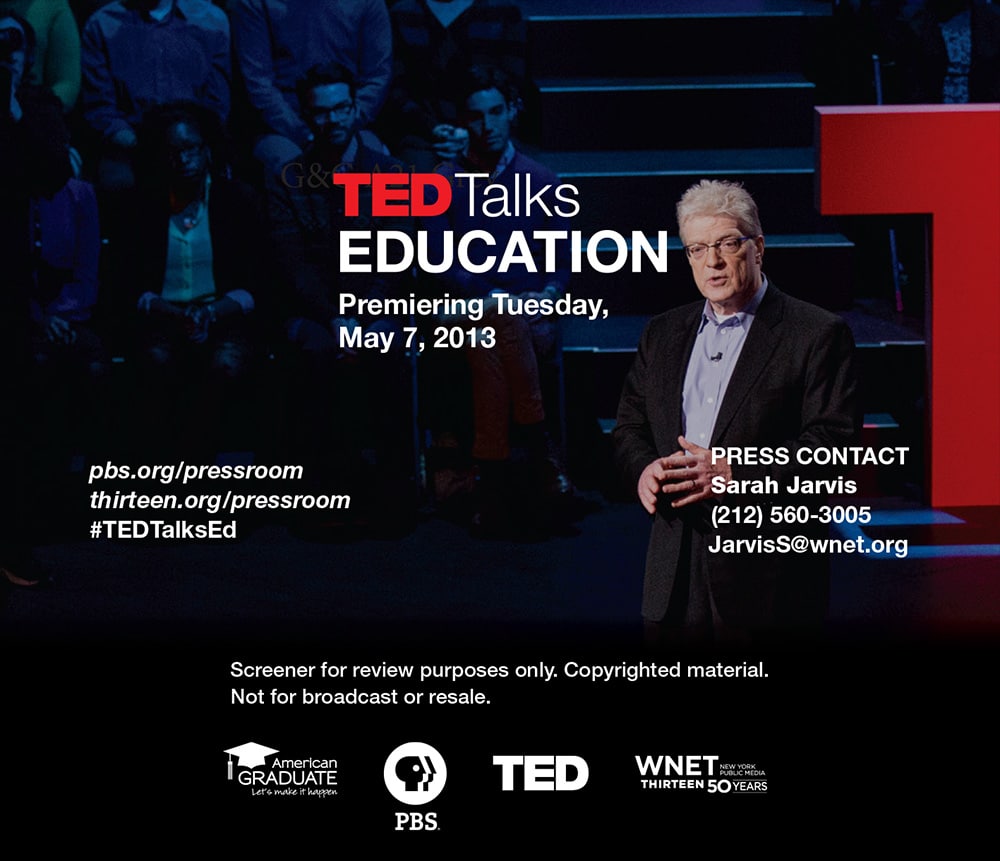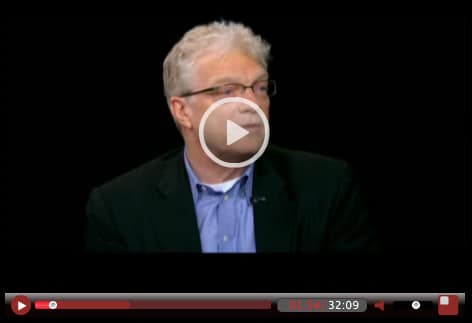Sir Ken Robinson speaks to Paddy O'Connell
When we launched in Finding Your Element in the UK, I went to BBC Radio 2 in London for an interview and call-in with Paddy O Connell. This is how it went:
Every Child Is An Artist
"What do Disney television honcho Anne Sweeney and internationally renowned education theorist Sir Ken Robinson have in common? Ideas for unlocking creativity in both children and adults."
Click here to read full article / By Chuck Salter / Creative Conversations / Fast Company
Charlie Rose Interview
I really enjoyed this interview with Charlie Rose hope you will too...
Click here to view on Bloomberg.com
Huffington Post – TED Weekends

TED Talks Education
What should America do about its disastrous high school dropout rate? That’s the focus of TED Talks Education, the first ever TED/PBS television special, hosted by John Legend, the award winning musician. The program looks not only at what’s going wrong in high schools, but how to put it right. As it happens, the solution is not a mystery; but putting it into practice will involve a major shift in current policies.
In 1970, the US had the highest rates of high school graduation in the world, now it has one of the lowest. According to the OECD, the overall US graduation rate is now around 75%, which puts America 23rd out of 28 countries surveyed. In some communities the graduation rate is less than 50%. About 7,000 young people ‘drop out’ of the nation’s high schools every day, close to 1.5 million a year. The social and economic costs are enormous.
Research indicates that in general high school graduates are more likely to find employment, to earn at higher levels and to pay more taxes than non-graduates. They’re more likely to go on to college or other learning programs. They’re more likely to engage positively in their communities and less likely to depend on social programs. It’s not true, of course, that pulling out of high school inevitably leads young people into trouble. Many high school ‘drop outs’ have gone on to have extraordinary, successful lives. What is true is that a very high proportion people who are long term unemployed, homeless, on welfare or in the correctional system do not have high school diplomas.
According to one estimate, if the numbers of young people leaving school early could be cut by 50%, the net gain to the US economy from savings in social programs and gains in additional tax revenues could be around $90 billion a year – that’s almost $1 trillion in just over ten years. That’s a big number. But think too of the potential social benefits to all of us of hundreds of thousands of young people moving on every year to lives that are more productive and fulfilling.
We’ve known about the dropout crisis for a long time. In 1983, the Reagan administration published A Nation at Risk, a dire warning of the need to reform US schools. In the thirty years since then, federal and state governments have launched hundreds of initiatives and spent billions of dollars trying to do just that. In the ten years since the launch of No Child Left Behind, these efforts have intensified. The results have been unimpressive. Graduation rates continue to falter and students and teachers alike are becoming more disaffected. So what’s the real problem here?
One of the themes of TED Talks Education is that current policies are based on a tragic misdiagnosis of the problem. They treat education as an industrial process rather than as a human one. They are driven by a culture of testing and standardization that has narrowed the curriculum and sees students as data points and teachers as functionaries rather than as living breathing people.
To improve our schools, we have to humanize them and make education personal to every student and teacher in the system. Education is always about relationships. Great teachers are not just instructors and test administrators: they are mentors, coaches, motivators, and lifelong sources of inspiration to their students.
Dr Rita Pierson has been a professional educator since 1972. Her parents and grandparents were teachers too. She knows too that every student can be educated and the art of teaching is to find the best way of doing that. “Every child,” she says, “deserves a champion who will never give up on them … and insists they become the best they can possibly be.”
Teaching is an art form. Great teachers know they have to cultivate curiosity, passion and creativity in their students. Ramsey Mussallam is a high school chemistry teacher, who shows how achievement soars when teachers fire the imaginations of their students with a true spirit of inquiry.
All students have their own stories, motivations and circumstances and teachers have to connect with them personally. Psychologist Angela Lee Duckworth talks about the importance of encouraging students’ positive attitudes to life and learning – or ‘grit’, as she calls it. Pearl Arredondo is a powerful example of grit.
She who grew up as the daughter of a ‘ranking gang member” in East Los Angeles. After being ‘saved’ by inspirational teachers, she qualified as a teacher herself and returned to her old school to help transform the lives of others. “Everyone has a story,” she says. “Everyone has a struggle and everyone needs help along the way.”
All young people have unique talents and interests. In his moving poem, Malcolm London argues that education has to connect with the real lives of young people and not stifle their hopes and dreams. This is one of the themes of my own new book, Finding Your Element: How to Discover Your Talents and Passions and Transform Your Life.
Geoffrey Canada is the founder of the Harlem Children’s Zone, which has a 100% graduation rate. We have millions of young people walking away from education, he says. But “right now, we could save them all”, if we’re prepared to innovate fundamentally and not just do more of the same. He sees schools everywhere following the same dull routines as when he was at school over 50 years ago, “and no-one is going crazy enough about it to say that enough is enough … America can’t wait another fifty years to get this right.”
The key to personalizing education is to invest properly in the professional development of educators. As Bill Gates argues, teachers need mentors too. Supporting educators to become the best they can be is one of the surest routes to improving the nation’s schools. In my view, we should then give them the creative freedom to innovate and do their jobs within a proper framework of public accountability.
There are those who say that we can’t afford to personalize education to every student. The fact is that we can’t afford not to. Watch the program and see what I mean.
Sir Ken Robinson
Stepping Up To The Plate

Last Saturday, I made my professional debut at the AT&T Park, celebrated home of the San Francisco Giants baseball team. At 10.00 am I was sitting by the dugout in the bright morning sunshine, waiting to be called onto the famous field. An excited crowd of several thousand people was buzzing with anticipation. As I looked out across the manicured green diamond, it was a moment to reflect on the improbable turns our lives can take. I was born in England. I live in Los Angeles. I don’t play baseball and I don’t understand it. Yet here I was, about to be center stage at the hallowed scene of so many World Series triumphs. (Should it really be called the World Series when there are no other countries involved?)
Fortunately, I wasn’t there to pitch balls but to pitch ideas, as a guest speaker for the annual conference of an extraordinary gathering of parents, students and educators. Parents Education Network is a broad coalition of students and adults that aims to facilitate educational success for students with learning differences (LD). Founded in 2003, PEN has become the Bay Area's premier grass roots resource for parents, professionals and students dealing with learning issues.
PEN convenes conferences, lectures and workshops that bring local and national practitioners to speak to parents and educators. It runs SAFE Voices, a group for LD teens, with volunteers from local educational and psychological professionals. It also runs school advocacy and support groups, which train parent volunteers in local schools to liaise with the administration and to network with other parents to discuss common issues.
In 2009, PEN students launched the Education Revolution, a full day of workshops, conversations and events day dedicated “to understanding each child’s individuality in learning as the basis for creating new educational environments”. With characteristic ambition and energy, EdRev has been held each year at the Giants’ Stadium and it gets bigger every year too. This year’s event also included a fascinating keynote from Dr L Todd Rose of the Harvard Graduate School of Education on “the emerging new science of the individual and its implications for education, the workforce, and society.” Dr Rose and I developed similar themes.
One of the deep problems of the standards and testing movement is that it promotes a very narrow view of ability in schools and a culture of conformity. The fact is that all students are different. Like you and me, they all have different talents, different interests and different ways of learning. Individual achievement is not marked by so much conformity as by diversity. People with ‘learning differences’ may well have other strengths and talents that standardized education completely overlooks. Discovering our real abilities is at the heart of creating our best lives. And we do create our lives.
As I sat near the dugout, I thought about how my own life had been shaped by the teachers I met, the mentors I’ve had and how my own path to the Giants’ stadium had been shaped by the interests I’d evolved over my life and the passions that I’ve discovered myself and that others have encouraged in me. Every life is a process of improvisation between our talents and dispositions and the opportunities we take or turn away from.
At the PEN event, I met students and parents with remarkable stories of achievement as they’ve learnt to overcome the narrow view of learning that dominates education. This view creates problems for all students, including those who actually succeed in the current system. PEN’s campaign has important implications not only for students with recognized learning differences, but for understanding the diversity and individuality of all students. It’s a campaign we should all be waging. Wherever we are, we should step up to the plate.







